Claiming Delhi's streets to 'break the cage' for women
- Published
Campaigners say the hostel curfews are ''discriminatory''
Young female students in the Indian capital, Delhi, are fighting to assert their right to public spaces with a campaign called Pinjra Tod (Break The Cage). The BBC's Geeta Pandey joins them for a night as they go out to "claim the streets" and fill them with their "dreams and desires".
Just as night falls, about 60 young women and men begin marching through some of Delhi university's premier colleges.
Many are carrying posters, they shout slogans, halt outside women's hostels, recite poems and break out into impromptu dances.
"We don't need no false protection, you can't cage half the nation," they sing.
One young man plays a drum hanging around his neck, while a woman wearing a red sari gives a lively speech.
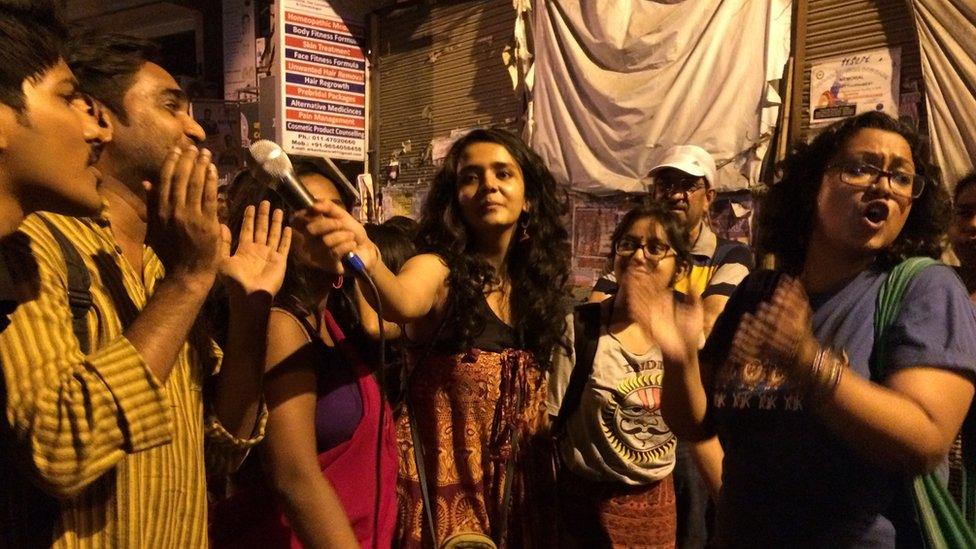
We are saying this is not about women's safety really, this is about moral policing"
At regular intervals, the participants - Delhi university students past and present - whistle and clap in approval or chant "shame, shame".
The issue that has brought all these men and women out on to the streets is what is called the "curfew hour" in women's hostels - the deadline by which residents must return to their rooms.
"It is discriminatory," says Devangana Kalita, a 26-year-old researcher and co-founder of the Pinjra Tod movement.
"Curfews and deadlines in the name of providing protection and safety are actually mechanisms of reproducing patriarchy. We are saying this is not about women's safety really, this is about moral policing."
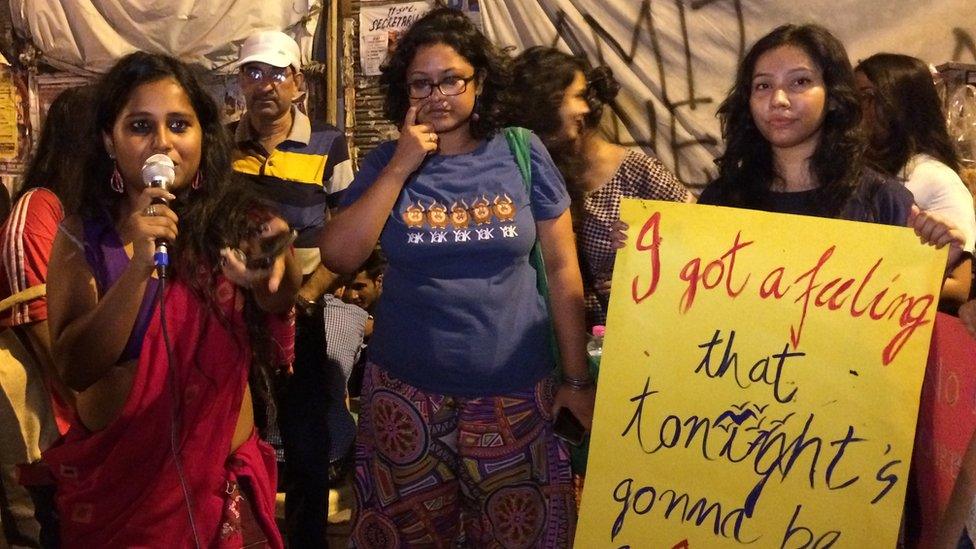
Protesters say the march to claim the streets by female students is "unprecedented" and "historic".
Students say most women's hostels - whether run by the university or privately-owned - follow curfew hours. Some lock their gates as early as 6:30pm or 7:30pm while a few allow students to remain out until a little later.
They say while curfew times are stringently enforced in women's hostels and those who break them run the risk of being expelled, hostels for men, which also have curfew hours on paper, rarely enforce them.
Libraries and laboratories in the university are open until much later - till midnight or in some places, even until 2am - and curfew hours mean women have no access to them.
"The university infantilises you," says Ms Kalita.
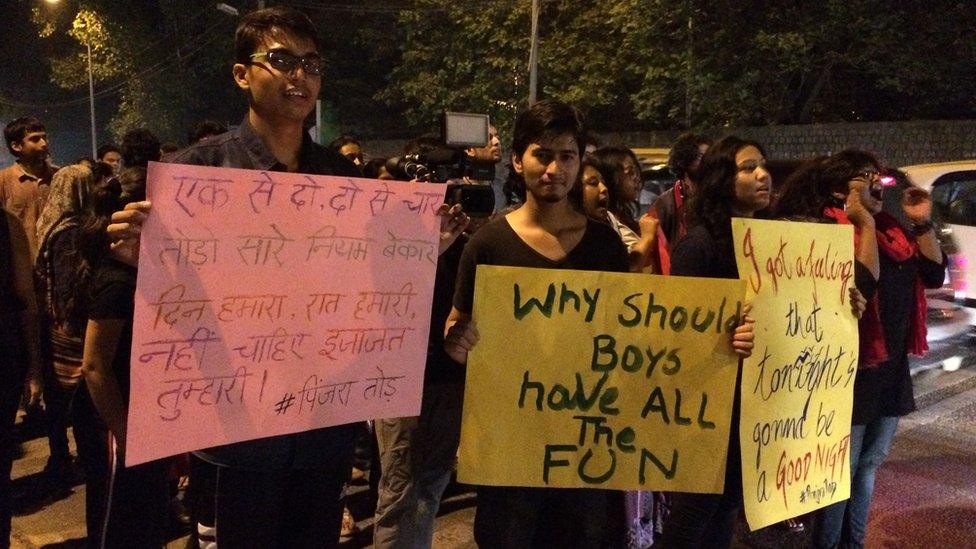
Libraries and laboratories in the university are open late - and curfew hours mean women have no access to them.
"They don't see you as equipped to handle your safety on your own, they say we will be your guardians, they impose these restrictions on you so they can mould you into a particular kind of a girl who is saleable in the marriage market, who does not cross boundaries.
"But tonight, we are out to claim the streets, to fill the streets with the audacity of our dreams and desires," she adds.
Shambhawi Vikram, a 23-year-old arts student, who lives in a private hostel - which are called PGs or "Paying Guest" hostels - says the restrictions are "humiliating" but being locked up can also be dangerous and life-threatening.
"Two years ago, there was an earthquake in Delhi. As our building shook, all of us who lived on the lower floors rushed out, but 20 students who lived on the fourth and fifth floors were stuck, because they were locked up. It was frightening, they all ran out into the balcony and looked at us. We could only look at them. We all felt so helpless."
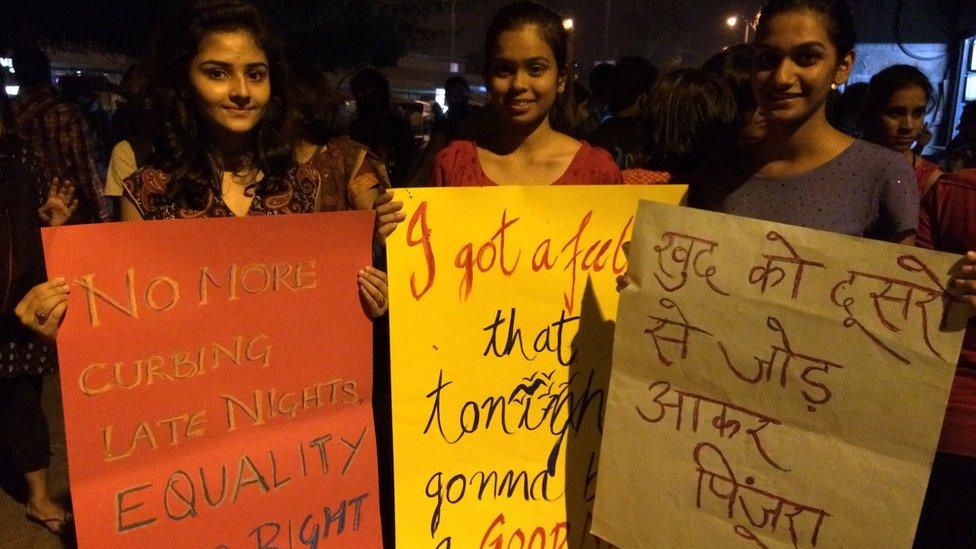
Campaigners say that the idea that locking up women will keep them safe is very flawed logic.
Rafiul Rahman, a 23-year-old postgraduate student who is among the protesters, says the march to claim the streets is "unprecedented" and "historic".
"Something like this has never happened before in the university. It's crazy to lock up women after 7pm. You have to question and challenge irrational norms."
Mr Rahman says whenever he steps out at night, there are a lot of men sitting and smoking and drinking chai, "but you don't see a single woman - and that must change".
Campaigners say that the idea that locking up women will keep them safe is very flawed logic.
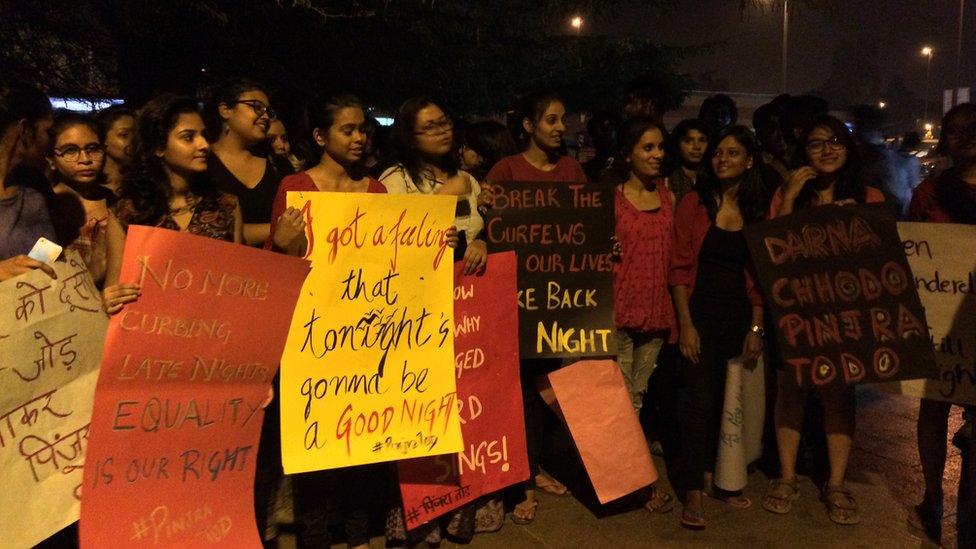
"We are trying to create a new imagination, about what public spaces could be like".
"You can't keep women safe by keeping them away, it does not make any sense. Streets will be safer only when we have more women on the streets," Mr Rahman says.
With their night walk, Ms Kalita says, "we are trying to create a new imagination, about what public spaces could be like".
Protests by students in the past have forced the authorities to relax timings somewhat, but the Pinjra Tod campaigners say that's not enough.
The campaigners are using social media, external to mobilise students - and others - across Delhi and beyond to broaden their movement for freedom.
Ms Vikram says in India, women across ages and class live in cages and they have to fight to escape these prisons throughout their lives.
"Some 40-50 years ago, women had to break the cage to get in to university, today we are trying to break the cage to get to the library after 7pm.
"Even Cinderella could stay out until midnight. Why can't we," she asks?